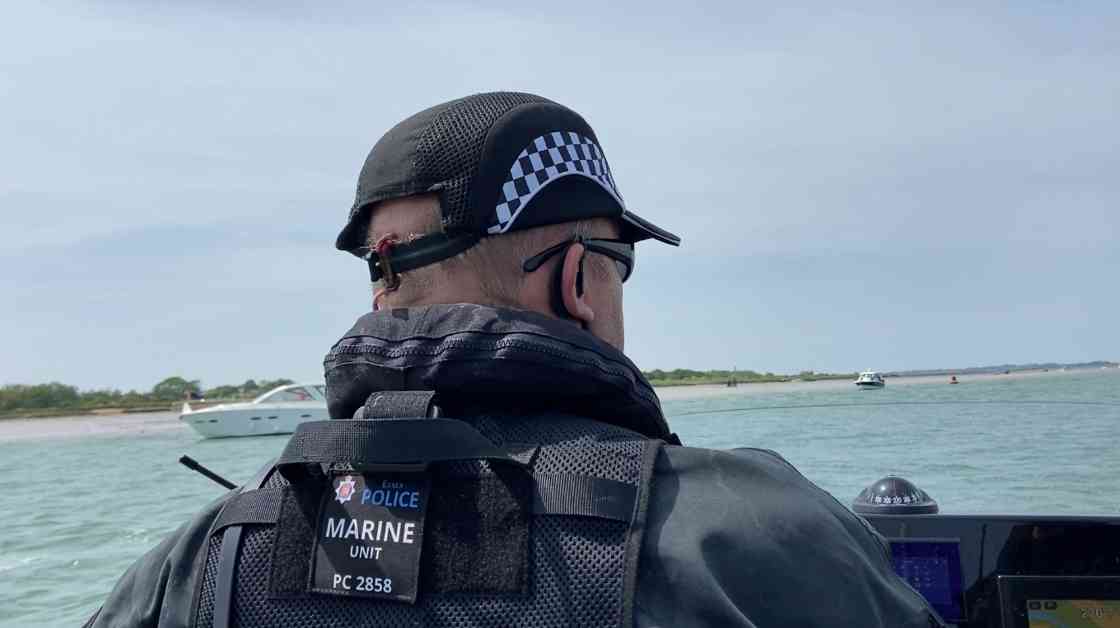Man Fined for Speeding 4x Water Speed Limit Near Essex Harbor
A man has recently been sentenced for speeding at a shocking four times the water speed limit near an Essex harbor. Mark Halliwell found himself in hot water after being stopped by officers from the Essex Police Marine Unit during one of their routine patrols near Brightlingsea harbor. The incident occurred on the River Colne, where Halliwell was found guilty of exceeding the 8-knot speed limit in that particular area.
Sergeant Alex Southgate of the Essex Police Marine Unit expressed his concern over Halliwell’s reckless actions, stating that he had accelerated aggressively from the beach on a personal watercraft, reaching speeds of approximately 30 knots. This speed was nearly four times the legal limit of 8 knots in the specified zone. Operation Wave-Breaker patrols, like the one that caught Halliwell, are crucial for maintaining safety in areas known for water-based anti-social behavior and where local byelaws are often ignored.
The responsibility for administering the River Colne byelaws falls on Colchester Council, which pursued the prosecution against Halliwell on September 19. Despite efforts to educate the public on the dangers of speeding on the water and the potential risks to both people and wildlife, Halliwell’s blatant disregard for the speed limit left authorities with no choice but to take legal action against him.
In a court appearance at Chelmsford Magistrates’ Court, Halliwell, a resident of Paxfords in Basildon, admitted to the offense committed on May 10, 2024. As a result, he was fined £80 and ordered to pay £150 in court costs, along with a £32 victim surcharge. This penalty serves as a reminder of the consequences of flouting water speed limits and the importance of adhering to regulations to ensure the safety of all water users.
Importance of Water Safety Regulations
The incident involving Mark Halliwell highlights the critical importance of adhering to water safety regulations, particularly when it comes to speed limits on the water. Excessive speeds can pose significant risks not only to the individuals operating watercraft but also to other water users and the surrounding wildlife. By enforcing strict speed limits, authorities aim to create a safer environment for everyone enjoying water activities near harbors and other water bodies.
Water safety regulations are put in place to prevent accidents, protect individuals, and preserve the natural environment. Speed limits help control the flow of traffic on the water, reducing the likelihood of collisions and ensuring that all water users can coexist harmoniously. Violating these limits, as in the case of Halliwell, can have serious consequences, both in terms of legal penalties and the potential harm caused to oneself and others.
Role of Law Enforcement in Ensuring Water Safety
Law enforcement agencies, such as the Essex Police Marine Unit, play a crucial role in ensuring water safety and enforcing regulations to prevent incidents like the one involving Mark Halliwell. Through regular patrols and operations like Operation Wave-Breaker, these agencies monitor waterways, educate the public on safety measures, and take action against individuals who violate water safety laws.
The presence of law enforcement on the water serves as a deterrent to reckless behavior and sends a clear message that compliance with regulations is non-negotiable. By holding individuals accountable for their actions, authorities send a strong signal that endangering oneself and others through speeding on the water will not be tolerated. This proactive approach helps maintain order and safety on the water, protecting the interests of all water users and preserving the natural beauty of our waterways.
In conclusion, the case of Mark Halliwell serves as a cautionary tale about the importance of respecting water safety regulations and the consequences of disregarding speed limits on the water. By upholding these regulations and enforcing them effectively, authorities can ensure the well-being of all water users and safeguard the natural environment for future generations to enjoy.













